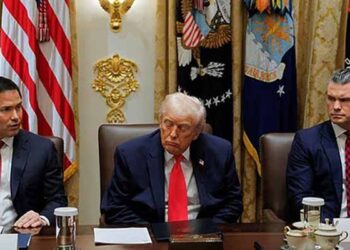Select Language:
The phrase “The words are nearly sacred for Americans: The First Amendment to the US Constitution guarantees free speech” highlights the importance of free speech in American culture. However, this right is now being challenged following the assassination of right-wing activist Charlie Kirk.
On Thursday, several top Democrats accused President Donald Trump of attacking free speech, especially after he praised ABC’s suspension of talk show host Jimmy Kimmel, who criticized the political right for using Kirk’s death to their advantage. The American Civil Liberties Union (ACLU), a prominent rights organization, criticized the Trump administration for acting outside constitutional boundaries to target its opponents, comparing this behavior to the McCarthy-era Red Scare of the 1940s and 50s.
Christopher Anders, the ACLU’s director of democracy and technology, said, “This goes beyond McCarthyism. Trump officials are abusing their powers to silence ideas they dislike, deciding who gets to speak, write, or joke.”
So, what exactly does the First Amendment say? And why is it under scrutiny?
“How We Define Ourselves”
Ratified in 1791, the Bill of Rights includes the first 10 amendments to the Constitution, safeguarding the fundamental rights of Americans. The First Amendment states, “Congress shall make no law respecting an establishment of religion, or prohibiting the free exercise thereof; or abridging the freedom of speech, or of the press; or the right of the people peaceably to assemble.”
David Super, a law professor at Georgetown University, considers the amendment central to American identity. He explains that despite the country’s diverse ethnicities and backgrounds, Americans largely unite around the belief in open discussion and the idea that the government should not silence its citizens. Eugene Volokh, a law professor at UCLA, notes that even speech that is morally offensive is protected by the First Amendment.
However, the U.S. history also shows ongoing efforts to suppress dissenting voices—laws like the 1798 Sedition Act, signed by President John Adams, criminalized “any false, scandalous, or malicious writing against the government.” During World War I, pacifist expressions were banned. From the 1920s to the 1950s, advocating for communism could lead to severe consequences. The civil rights movement in the 1960s faced opposition from authorities trying to silence their protests.
A key aspect of Trump’s political approach has been attacking “cancel culture”—the practice of criticizing or ostracizing individuals for their unpopular opinions, sometimes leading to job loss or social exclusion. Trump often labeled “cancel culture” a leftist menace, claiming it silenced conservatives.
Democrats, however, argue Trump has been guilty of the same, targeting U.S. media outlets, universities, and now Jimmy Kimmel. Former President Barack Obama criticized this trend on X (formerly Twitter), stating, “After years of complaining about cancel culture, the current administration has taken it to a dangerous new level.”
Conservative Responses
U.S. Attorney General Pam Bondi stirred controversy by suggesting the Justice Department would pursue anyone guilty of “hate speech” connected to Kirk’s death. Republican Senator Ted Cruz countered, claiming the First Amendment “absolutely protects hate speech.” Bondi clarified she meant “threats of violence that individuals incite against others.”
Tucker Carlson, a conservative commentator, called for “civil disobedience” if Kirk’s murder prompts stricter free speech laws. On the far right, critics have condemned a recent Trump order making flag burning punishable by up to a year in prison—despite the 1989 Supreme Court ruling affirming such actions as protected free speech.
Jesse Kelly, a conservative radio host, wrote on X, “I would never harm the American flag, but if a president tries to stop me, I’m as close as I’ll ever be to burning one myself. I’m a free American, and if I want to torch a flag, I will.”







